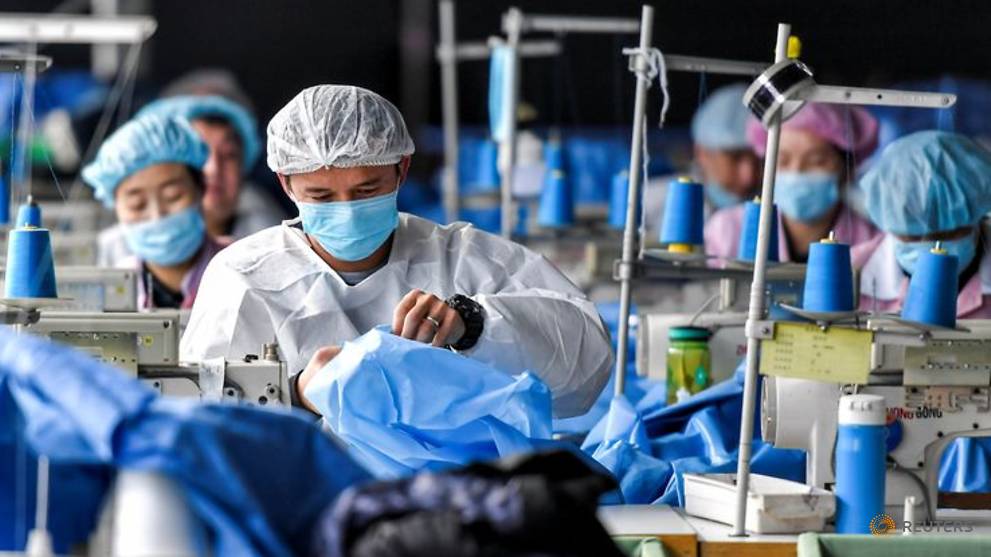
China's factory activity falls in January as Wuhan coronavirus fears grow
BEIJING: China's manufacturing activity slipped in January, official data showed on Friday (Jan 31), as the country grapples with a new virus that has claimed more than 200 lives.Official figures released on Friday showed that the Purchasing Managers' Index (PMI) for manufacturing, an early gauge of factory activity, came in at 50.0, down slightly from 50.2 in the month before.A reading above 50 indicates the sector is expanding while below 50 shows a contraction.The findings come as China battles the spread of a new virus that has caused an unprecedented shutdown of transport and manufacturing in China, and locked down much of Hubei province - the epicentre of the outbreak.
READ: Wuhan virus death toll hits 213 in China, nearly 10,000 infected
READ: Wuhan virus outbreak - At a glance
But the National Bureau of Statistics warned that because the survey was conducted before Jan 20, "the impact of pneumonia caused by the new coronavirus has not yet (been) fully manifested"."Future trends will need further observation," it said in a statement.The first cases of the outbreak appeared in early December, but many of the restrictions came into effect over the last week, after the data were gathered.
"I would disregard today's release," said Raymond Yeung, chief economist for Greater China at ANZ, in an email to Reuters."The figure certainly overrates the economic outlook as it does not reflect the interruption due to the outbreak," he said.
READ: Wuhan virus - Singapore's economy will be impacted, but is diversified enough to mitigate uncertainty, says Manpower Minister
The PMI's component indicators painted a mixed picture of the sector.New export orders slipped back into contraction after rising for the first time in over a year in December while production slowed from a multi-month high but remained in expansionary territory. Total new orders expanded at a slightly faster clip than the month before.
Demand ahead of the Chinese New Year holiday was said to have contributed to December's expansion after a tough year for China as it underwent a bruising trade war with the United States. China's economic growth cooled to its weakest in nearly 30 years in 2019.But despite a partial trade deal signed in mid-January, the latest numbers come as China took a hit in recent weeks from the spread of the new virus.
The sub-index for imports fell deeper into contraction.Factories also continued to shed jobs in January, although the pace of reduction slowed.
China watchers typically advise caution in their analysis of economic data early in the year due to the effect of the week-long Chinese New Year holidays, which usually slows activity.Many firms scale back operations or close for long periods around the holidays, which began on Jan 24 this year. This year, China's government extended the Chinese New Year holidays to limit the spread of the virus.
Commentary: Wuhan virus – how prepared is your company? What gets green, amber and red rankings
In contrast, activity in China's service sector quickened with the official non-manufacturing PMI rising to 54.1 from 53.5 in December.
However, the outbreak has been seen hitting service sectors such as transportation, tourism, catering and entertainment as people avoid crowded areas.
Chinese holidaymakers have been staying home in a highly unusual Chinese New Year this year as local authorities closed public attractions, cancelled major events and urged people to avoid large gatherings.Cinemas around China have closed as well during what is generally a prime time for blockbuster releases.Other countries have told their citizens to avoid travel to China, with several airlines trimming back their schedules.
READ: WHO declares international emergency over Wuhan virus
LISTEN: Wuhan virus – The WHO, Singapore's infectious diseases authority and a global outbreak expert answer your burning questions
Manufacturers, too, are not taking any chances, with Taiwanese tech giant Foxconn keeping its Chinese factories closed until mid-February.
Toyota, IKEA, Starbucks, Tesla, McDonald's and Volkswagen were among the corporate giants temporarily freezing production or closing large numbers of outlets in China.
The holidays may mean there is little immediate impact on auto-manufacturers' production, but there is growing concern surrounding the virus' longer-term effects on the economy.
"Extended closures could ripple through supply chains across China and beyond," Capital Economics said in a note to clients this week.

Analysts estimated its impact on China's economy could be bigger than that of severe acute respiratory syndrome (SARS), which also originated in China and killed nearly 800 people globally in 2002 and 2003.One bright spot might be construction, Capital Economics said in a note, with the sub-index for the industry rising to 59.7 in January from 56.7, a sign local governments have been quick to begin new infrastructure projects this year.
"We expect a big plunge of both manufacturing and service PMIs in February and March due to the coronavirus outbreak," Ting Lu, chief china economist at Nomura, said.
Beijing will try to provide liquidity and credit support to the economy, especially to businesses severely hit by the outbreak, he said.
"However, it seems unlikely that these measures would turn the economy around in Q1 and part of Q2, as the virus outbreak may further weaken domestic demand and thus render the upcoming policy easing less effective."
BOOKMARK THIS: Our comprehensive coverage on the Wuhan Coronavirus and its developments
Download our app or subscribe to our Telegram channel for the latest updates on the Wuhan virus outbreak: https://cna.asia/telegram